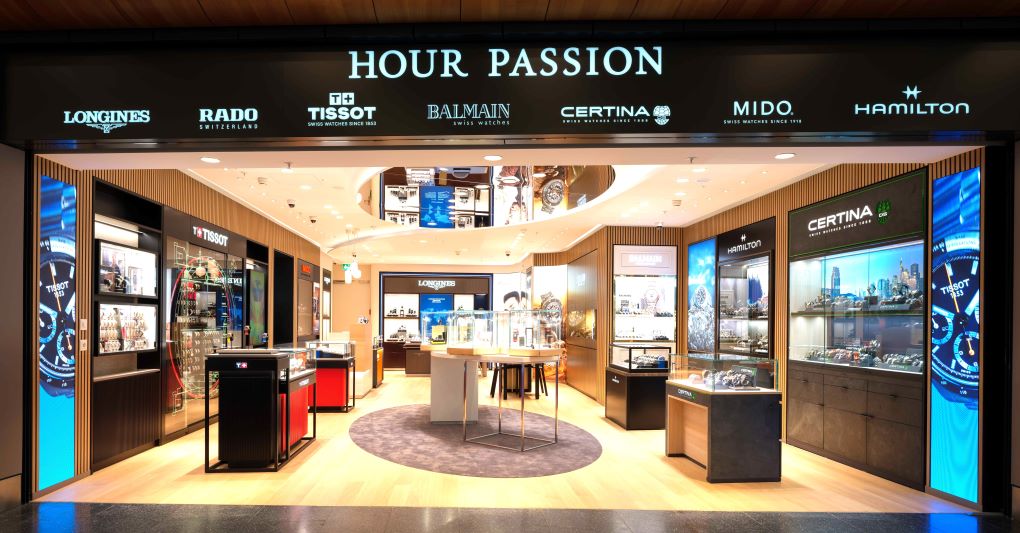EUROPE. Leading brand owners have said that values such as diversity, authenticity and sustainability will help travel retail remain relevant to a much-changed consumer base post-COVID-19.
Speaking on day two of the ETRC Business Forum on Thursday were Coty Executive VP Global Travel Retail Caroline Andreotti, JTI Corporate Affairs & Communications Director Worldwide Duty Free Gemma Bateson, Nestlé International Travel Retail General Manager Stewart Dryburgh, Duty Free Global Founder Barry Geoghegan and Ermenegildo Zegna Head of EMEA, LATAM, Global Travel Retail & Outlets Francis Gros.

Importantly, the panellists underlined their respective companies’ commitment to the travel retail sector while emphasising that fresh approaches to industry partnership are required, and that challenges such as data-sharing must be tackled head on.
Caroline Andreotti, who was named to her new role at Coty last September, said: “We believe in a strong future for travel retail. This is still a fantastic place to build brands and drive experiences, and we are very confident that travellers will come back once the lockdowns are eased, as we see happening already in China.
“From an organisation point of view at Coty, travel retail has recently become a standalone division and that shows the commitment and the confidence that management has in travel retail and its recovery.”
She said that Coty planned to “refocus” its efforts to engage with consumers, “and ignite a genuine dialogue between brands and consumers in an omnichannel and relevant way”.
Andreotti said that expectations in beauty have shifted, with a larger focus on “one’s own health, wellness, self-care and a real desire for sustainability”.
“Our expectations for 2021? In beauty, consumers expect brands to have a profound mission, that allows them to live better, not just look good or smell better. Their priorities are really shifting now. At Coty we needed to review our brand portfolio, our innovations, and really meet consumer demand for safety, for health, for being green, but also for being inclusive and authentic.

“The skincare category has grown exponentially yet consumers now want more effective products. We see clinical brands taking the lead now. In makeup, one of the most impacted categories by the crisis, we have seen the benefits of skincare ingredients infused now into makeup products.
“Sustainability and clean beauty are becoming more important with brands expected to be safe and environmentally responsible. Consumers today are looking for brands that are natural, gentle and vegan.
“Fragrance is also experienced changes, with consumers expecting brands to deliver more profound messages such as inclusivity, diversity and authenticity. They’re also expecting brands to deliver more storytelling and to drive sustainability.”
Brands and retailers must join forces to offer online to offline experiences, she added. “More than ever consumers will expect offline stores to be entertaining, experiential and engaging, while they still make purchases online.

“This is a time to accelerate a seamless, omnichannel presence and experiences, and continue to innovate in retail. We must make store experiences even better than before, implement innovative digital technologies and personal services. This is how we are going to remain relevant in travel retail. 2020 was full of challenges. Travel will come back and I believe that it will provide a significant lift to the industry for years to come.”
Later, addressing a question about learning the lessons of engaging with consumers as the COVID-19 crisis has eased in China, Andreotti said: “We must [communicate] the message that shopping is safe. We must be engaged in great storytelling on our retailers’ websites, do livestreams, engage the community online. We are also a tactile industry so people want to test and touch.
“We had to put in place a lot of touchless digital solutions in our points of sale. Many brands have been extremely creative in introducing new and innovative technologies at the points of sale to engage the consumer: QR codes, augmented reality virtual trials on Instagram, livestreams. We have also implemented augmented reality screens where consumers could try on lipsticks and foundations in a fun, visual way. And we have also started virtual testing of fragrance remotely.
“That comes at a price. Consumers today, if they exchange personal information, expect a lot in return from the brands in terms of personalised service. They want to have something that is unique to them in the future. And you see more and more beauty products actually coming with personalised solutions, like make your own hair colour or make your own lipstick, and these are things that consumers will want more and more in the future.”
“Sustainability is the other area in which are very active. Consumers are expecting beauty to deliver not only solutions, fixing problems, storytelling, to be compassionate and come with messages that have an impact on society.”

Partnership in practice
JTI’s Duty Free Gemma Bateson noted that the uncertainty of the timing of recovery presented a huge planning challenge for the business – and for tobacco that is overlaid with the challenge of regulation.
More positively, JTI has identified this period as an opportunity to reframe partnerships, to enhance trust, share information and change the way the industry works. “We have a blank piece of paper and what do we have to lose? It’s a mix of back to basics enhanced by the experiences that shoppers are seeking and that uniqueness of duty free.
“Partnership needs to cover all actors: airlines, airports, brands, retailers and distributors. We were the second fastest growing channel in the world in 2019 after online. We can exceed that. The opportunity is huge. We should take confidence it will come back. We will get overtaken if we don’t act like partners. That means getting data on the table – we need retailers, airports, airlines and brands to step up, trust and share. Shopper expectations have changed, so we cannot meet them with 2019 data.
“For our category, when people have travelled, we have seen tobacco perform. It is still a core category. It is still a reason to come into the store. If we go back to clear messaging, pricing and signage, we will encourage more people back into the stores. And that is our focus.”
Consumer first
Stewart Dryburgh highlighted the requirement for a ‘consumer first’ view. “The consumer is channel agnostic, they don’t care where they buy,” said the Nestlé ITR chief. “We saw a five-year leap in ecommerce participation in the US last year; what we don’t want is a five-year negative step change for our industry. It’s about seizing a huge opportunity which comes when that consumer is with us in our environments. Our proximity to the customer is what we need to leverage.

“One of the plus points for confectionery is that it is price-accessible and a way to get people back into the habit of shopping. There is also an opportunity to widen the food category. Key themes going forward are going to be Sense of Place and sustainability. Consumers today and tomorrow want to know, are you taking care of the planet? So there are opportunities.
“And one other thing: through this crisis, Nestlé too has retained a dedicated duty free department, which gives out the message that this channel matters.”
“Relevance and revolution”
Duty Free Global Founder and Commercial Director Barry Geoghegan called out the dangers to the industry if it did not fight to be relevant for emerging, younger consumer groups. Critically, he said, this means trialling new products, broadening of categories and building interest among travellers through the journey.
“I was brought up with the DNA of duty free,” he noted. “My father [Michael] worked with Aer Rianta International opening up new markets. My mother [Sheila] was part of the transatlantic crew with Aer Lingus so all I knew was that the duty free bag came home from every trip when I was growing up. But my kids are now in their 20s and it is not in their DNA. They have not bought into this culture. One of the things that this crisis has given us all is the opportunity to refocus and to recruit that younger generation.

“Can we physically align our stores so we have sustainable products at the front, with craft products prominent and more variety, but without the traditional layout. It is recruitment and revolution we need, not just the status quo.”
A new generation of travellers needs engaging before they travel, he added.
“We need to talk to them before they come to the airport. And when they are at the airport and when their experience is over, we must make sure that they share that experience. It is going to be a low touch environment in the future but people are not afraid to use their own smartphones. So we need to have, in my opinion, a duty free app that is globally acceptable to all, and depending on your location, gives you the best offers, getting people to plan before they travel.
“These people want diversity, they want experience, they want theatre. We need to bring new passengers to see duty free as relevant. The opportunities are endless but the opportunity cost of not doing it is very high.”
Lessons from crisis
Ermenegildo Zegna Head of EMEA, LATAM, Global Travel Retail & Outlets Francis Gros said: “We have gone back to the days of remote selling and not only online. CRM and data management has been a way for us to survive. We are having a reset in the industry.
“Sustainability sells provided you have a very strong story. In fashion we are reusing, recycling and making use of waste and leftovers. That is a part of the future.” Experience, diversity and deeper partnerships are also key, he added.
“We are in a rebuilding or reset phase now. The way we communicate as an industry is going to be important, to consider people as new to buying while travelling. There will be new first-time shoppers and we should welcome back other travellers. We have to create momentum as they return.”

Click here for the comments of TFWA President Jaya Singh, who opened this session with his views on the way forward for the sector.
ETRC President Nigel Keal concluded the event, saying: “I am delighted by the success of our first virtual ETRC Business Forum. It was very important for us at ETRC this year to use the Forum as a platform to support our industry in these turbulent times, and our cooperation with TFWA reflects that. From a personal point of view, I would like to think that the ETRC Forum has started the ball rolling in some small way to put some real meaning into the words ‘cooperation’ and ‘partnership’. Now is time to put words into action and work together for the recovery of our sector”.
ETRC said that its 2021 Business Forum drew participation from 350+ attendees across the European duty free and travel retail channel.
The first day was launched with a welcome address from Nigel Keal and included presentations from Retail Futurist Matthew Brown and IATA’s Alan Murray Hayden on the new Travel Pass initiative. A panel discussion covered policy priorities for ETRC such as arrivals duty free in the EU, Brexit, threats to product categories and digital labelling.
Day two included insights from Economist and Author David McWilliams, and a rallying call for travel retail to lead the way in travelling again from Gebr. Heinemann Director Corporate Affairs & Compliance Dr. Jennifer Cords and Journalist and Aviation Expert Cord Schellenberg.
Click for news from the sessions on travel retail’s identity and on the drive to introduce arrivals duty free shopping.
The ETRC sessions were chaired by ETRC Secretary-General Julie Lassaigne and TFWA Managing Director John Rimmer.












